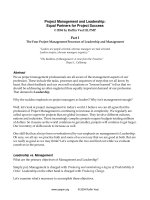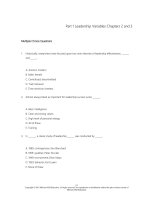Lecture Art of Leadership and Motivation - Lecture 14
Bạn đang xem bản rút gọn của tài liệu. Xem và tải ngay bản đầy đủ của tài liệu tại đây (545.77 KB, 21 trang )
Art of Leadership & Motivation
HRM – 760
Lecture 14
FACILITATOR
Prof. Dr. Mohammad Majid Mahmood
HOW TO DEAL WITH CRISIS ?
Stages of Crisis Management
Like most human events, crisis can be described in terms of stages,
or relatively identifiable sequences of events and reactions.
Stages enable planners to monitor risks, progress, target
stakeholders, and take strategic action appropriate to the stage.
Mitroff’s Stages of
Crisis Management Model
Avoiding Preparing to Recognizing Containing
manage crisis
crisis
crisis
crisis
Resolving
crisis
Learning from
crisis
1) Avoiding Crisis
a) Make crisis planning a part of your strategic planning
b) Get together and share ideas – work with colleagues
to analyze your situation
c) Perform a SWOT analysis
d) Narrow your crisisrisk list – focus on the crisis that
would have the worst result, would be most likely to
occur.
2) Preparing to Manage Crisis
Recognize the risks and costs
a) Brainstorm potential crisis. Consider the ‘whatifs‘.
b) Once you have determined what crises you need to plan for,
consider ways to minimize these risks and the costs for each
risk.
c) Consider everything that could go wrong, in the order of
importance and its costs.
Develop A Crisis Plan
After you have selected a key whatif scenario and analyzed
possible consequences, brainstorm the kinds of decisions that will
have to be made and who should make these decisions.
Also perform a reality check to identify possible unintended &
undesirable side effects.
DIG DEEP FOR THE
ROOT CAUSE
• Under the pressures of a crisis, there is temptation to
jump to quickfix solutions that may mask the real
problems and may result in repeated crisis.
• Symptoms Root Causes
• The only way to solve these problems is to understand
their root causes and implement real solutions
Crisis Management Team
CMT Composition: Membership should be based on
representation, knowledge, and skill.
CMT Responsibilities:
•
Coordinate all crisis related activities
•
Gathering and reviewing facts of crisis
•
Determining crisis response activities
•
Allocate resources
•
Specifying internal and external communications
•
Training staff
•
Establishing relationships with stakeholders
•
Monitor progress and continuing situation assessment
Ensure that all CMT members are
trained before the crisis occurs
CMT - Training
The training of the Crisis Management Team is one of the critical
success factors that must be addressed if an adequate response is to be
achieved.
Principles of Effective Training:
Training Need Assessment:
Contents:
Trainer:
Methods:
Evaluation:
Crisis Management
What
media
want to
know in
a crisis?
•
•
•
•
•
•
•
•
•
•
What happened?
Were there any deaths or injuries?
What is the extent of the damage?
Is there a danger of future injuries or
damage?
Why did it happen?
Who or what is responsible?
What is being done about it?
When will it be over?
Has it happened before?
Were there any warning signs of the
problem?
Media Demands
• Accuracy and simplicity
• Statistics which are explained
• Context of information
• Comments from highest authority
• Both sides of the issue
• Speed, speed and speed
YOU’RE IN THE SPOTLIGHT
• In a crisis, everyone watches what you do. Whether you
like it or not, you are in the spotlight.
• The key is getting out in front of the crisis in its first
hours with clear statements, both internally and
externally.
• Accept responsibility and build confidence &
credibility.
The Ideal Spokesperson
• Polite & patient
• Wellinformed
• Accurate & reliable
• Fluent
• Available
• Trustworthy
3) Recognizing Crisis
Is it a crisis?
Has the event in question caused, or does
it has the potential to cause
Yes
No
Injury to any person?
A threat to the health and safety of any person?
A threat to the environment?
A breakdown or a threat to your reputation?
A serious threat to employee’s morale and wellbeing?
A loss of data?
Serious financial loss?
A legal action against your organization
Interpreting your score: If you answered yes to any of the above questions, you
are probably dealing with an approaching crisis
4) Containing Crisis
“One’s objective should be to get it right, get it quick, get
it out, and get it over.”
Warren Buffet
1) When a crisis strikes, the first thing you must do is to contain
it.
2) You must make decisions quickly.
3) Be on the scene. Your physical presence is important.
4) Communicate about the crisis quickly – expect rumors and
false information, notify key people (management, general
public, or employees, vendors, government authorities and
clients), and stick to the facts (do not guess or attempt to
cover up).
5) Resolving Crisis
A crisis requires fast, confident decision making. But
how do you make good decisions when events move so
quickly, when things are confusing, and when it is hard
to sort out what’s important.
Managing emotions that accompany a crisis, effective
leader’s role, and taking effective action can help.
The Leader’s Role
A leader in crisis responds by:
Facing the crisis – turning fear into positive action
Being vigilant – watching for new developments and
recognizing the importance of new information
Maintaining focus on the priorities – ensuring that people
are safe first.
Assessing and responding
Taking action
Activate your crisis plan
Help everyone work together
Avoid blaming others
Do what needs to be done
6) Learning from Crisis
When you survive a crisis, don’t just try to put it behind you. Rather
take the opportunity to learn from the experience and make changes
to avoid or prepare for another similar event.
Review how the crisis was handled.
Ask yourself the following questions:
1. Could we have prevented the crisis? If so how?
2. At what point did we realize we were in crisis? Could we have
recognized the signs earlier?
3. What warning signals went off that we may have ignored?
4. What warning signals did we pay attention to?
5. What did we do right?
6. What could we have done better?
Crisis Management
• Publicly promise that to the best of organization's
ability similar situations will never occur
• Go beyond community`s and victim`s expectations.
• Adverse situations managed quickly cost far less and
are controversial for much shorter periods of time.
Prepare Contingency Plans in Advance
Plan for the Next One
Get input from everyone
Incorporate the ideas and information in your next
round of strategic planning.
Break the crisis down into component parts, to
analyze how you might handle a similar crisis more
effectively next time.
CRISIS MAY BE YOUR
DEFINING MOMENT
• The crisis you are facing, or inevitably will face, may be
the defining moment in your professional life.
• Leaders who don’t take advantage of crises to make
longterm changes not only waste opportunities but sow
the seeds for a repeat experience
• Do your best and leave the rest to ALLAH
FACILITATOR
Prof. Dr. Mohammad Majid Mahmood









